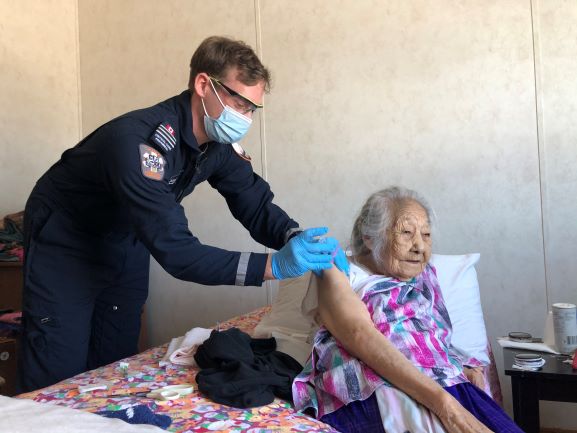Operation Remote Immunity aims to protect residents from COVID-19
By James MacDonald
On a cold morning in Neskantaga First Nation, about 450 kilometres north of Thunder Bay, people lined up early, eager to take part in a clinic that had been weeks in the making. As Chief Chris Moonias stepped into the building, he offered a message of hope through his smartphone.
“We come to you live from the Neskantaga Community Centre, where our vaccines will be administered,” said Chief Moonias, speaking to an online audience via Facebook Live. “I’ll be the first one up!”
As the camera livestreamed Chief Moonias’ video to his community and beyond, he made his way into a room where a waiting vaccination team had set up a clinic. Not long after, he received his first dose of the Moderna vaccine as cheers erupted throughout the room.
Remote, fly-in First Nations communities face unique geographic, social and infrastructure challenges that exacerbate the risks posed by the pandemic. To ensure Indigenous communities and vulnerable populations across remote Northern Ontario are protected from COVID-19, a unique collaboration was formed as a means of providing residents with access to the Moderna vaccine.
Neskantaga First Nation was one of the first communities to take part in Operation Remote Immunity, a partnership between Ornge, Ontario’s air ambulance and critical care transport service, and the Nishhawbe Aski Nation (NAN). Vaccination teams under the direction of Ornge will travel to 31 northern, remote NAN communities and the municipality of Moosonee to deliver and administer the vaccine to residents who wish to receive it. All residents age 18 or older are eligible.

The official launch of Operation Remote Immunity in late January 2021 was the culmination of six weeks of intense preparation and planning, both inside and outside the communities. Coordinators appointed by individual communities, along with Canadian Rangers, worked to prepare for the arrival of the vaccines and the teams.
“We thank the community leadership for allowing our teams to begin this important work, and we appreciate the many residents who are providing their assistance by encouraging participation, setting up the clinics, and translating,” says Dr. Homer Tien, President and CEO of Ornge. “This effort would not be possible without their support.”
In building the vaccination teams, Ornge worked with multiple partners, including Weeneebayko Area Health Authority (WAHA), Indigenous Services Canada, the Northern Ontario School of Medicine, Queen’s University, the University of Toronto, northern Paramedic services and Public Health Units, among others. Each team typically consisted of a team lead, four other healthcare professionals – including physicians, nurses, paramedics and medical students — and an administrator. Team members received the full COVID-19 vaccine and underwent cultural training prior to their participation.
Arrangements needed to be made to fly the vaccination teams safely from three northern hubs into five to seven communities each day. For aviation services, Ornge relied on the Ministry of Natural Resources and Forestry, as well as a number of contracted air carriers, including SkyCare, Air Bravo, Wasaya Airways, Air Creebec and Thunder Air.
In parallel to this planning process, public education campaigns carried out by regional partners, including the Sioux Lookout First Nations Health Authority (SLFNHA) and WAHA. These efforts were instrumental in addressing vaccine hesitancy, spreading the word that the vaccines are safe and effective, and encouraging participation among residents.
“Vaccination teams are being welcomed in communities across our territory,” says Nishnawbe Aski Nation Grand Chief Alvin Fiddler. “The number of community members giving their consent to receive the vaccine is encouraging.”
The day-to-day logistics of carrying out this campaign are not without challenges. The harsh winter weather common at this time of year across the north can result in conditions unsuitable for the safe transport of the vaccination teams, resulting in some clinic postponements. One clinic began its day with a temporary power outage. Even with these challenges, over the first few weeks of the campaign, more than 7,000 people attended clinics to receive their first dose.
In Neskantaga, Chief Moonias wrapped up his Facebook livestream as he waited in the clinic an extra 15 minutes post-vaccination as a precaution. His efforts to lead by example concluded on a note of encouragement for thousands of northern residents considering receiving the vaccine.
“Let’s protect our communities. Let’s protect our people. Let’s beat this virus.”
James MacDonald is Director of Communications and Public Affairs for Ornge.




